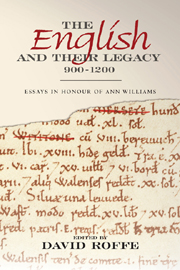Book contents
- Frontmatter
- Contents
- Figures and Tables
- Dedication
- Preface
- Contributors
- Abbreviations
- Ann Williams: a Personal Appreciation
- Life-writing and the Anglo-Saxons
- Meet the Swarts: Tracing a Thegnly Family in Late Anglo-Saxon England
- The Moneyers of Kent in the Long Eleventh Century
- Master Wace: a cross-Channel Prosopographer for the Twelfth Century?
- From Minster to Manor: the Early History of Bredon
- Eadulfingtun, Edmonton, and their Contexts
- The Family of Wulfric Spott: an Anglo-Saxon Mercian Marcher Dynasty?
- The Burial of King Æthelred the Unready at St Paul's
- Eustace II of Boulogne, the Crises of 1051–2 and the English Coinage
- Through the Eye of the Needle: Stigand, the Bayeux Tapestry and the Beginnings of the Historia Anglorum
- Robert of Torigni and the Historia Anglorum
- Invoking Earl Waltheof
- Hidden Lives: English Lords in post-Conquest Lincolnshire and Beyond
- Lordship and Lunching: Interpretations of Eating and Food in the Anglo-Norman World, 1050–1200, with Reference to the Bayeux Tapestry
- The Exchequer Cloth, c. 1176–1832: the Calculator, the Game of Chess, and the Process of Photozincography
- Ann Williams: a Bibliography 1969–2011
- Index
- Tabula Gratuloria
Life-writing and the Anglo-Saxons
Published online by Cambridge University Press: 05 April 2013
- Frontmatter
- Contents
- Figures and Tables
- Dedication
- Preface
- Contributors
- Abbreviations
- Ann Williams: a Personal Appreciation
- Life-writing and the Anglo-Saxons
- Meet the Swarts: Tracing a Thegnly Family in Late Anglo-Saxon England
- The Moneyers of Kent in the Long Eleventh Century
- Master Wace: a cross-Channel Prosopographer for the Twelfth Century?
- From Minster to Manor: the Early History of Bredon
- Eadulfingtun, Edmonton, and their Contexts
- The Family of Wulfric Spott: an Anglo-Saxon Mercian Marcher Dynasty?
- The Burial of King Æthelred the Unready at St Paul's
- Eustace II of Boulogne, the Crises of 1051–2 and the English Coinage
- Through the Eye of the Needle: Stigand, the Bayeux Tapestry and the Beginnings of the Historia Anglorum
- Robert of Torigni and the Historia Anglorum
- Invoking Earl Waltheof
- Hidden Lives: English Lords in post-Conquest Lincolnshire and Beyond
- Lordship and Lunching: Interpretations of Eating and Food in the Anglo-Norman World, 1050–1200, with Reference to the Bayeux Tapestry
- The Exchequer Cloth, c. 1176–1832: the Calculator, the Game of Chess, and the Process of Photozincography
- Ann Williams: a Bibliography 1969–2011
- Index
- Tabula Gratuloria
Summary
Among the thousands of names in the Durham Liber Vitæ, there are a number of memoranda, including a late tenth-century record of the manumission of a group of slaves:
[Geatfleda] has given freedom for the love of God and for the need of her soul: namely Ecceard the smith and Ælfstan and his wife and all their offspring, born and unborn, and Arcil and Cole and Ecgferth [and] Ealdhun's daughter, and all those people whose heads she took [that is, accepted them as slaves] for their food in the evil days. Whoever perverts this and robs her soul of this, may God Almighty rob him of this life and of the heavenly kingdom, and may he be accursed dead and alive ever into eternity. And also she has freed the men whom she begged from Cwaespatric, namely Ælfwold and Colbrand and Ælfsige and his son Gamal, Ethelred Tredewude and his stepson Uhtred, Aculf and Thurkil and Ælfsige. Whoever deprives them of this, may God Almighty and St Cuthbert be angry with them.
It is tempting to assign this manumission to the troubled reign of Æthelred II, the subject of a biography by Ann Williams, published in 2003. That said, the ‘evil days’ mentioned may have been the result of famine induced by natural disaster, rather than the consequences of the return of the Viking armies in Æthelred's reign.
Leaving aside the name of God, the memorandum names seventeen individuals, including Cuthbert, the Northumbrian saint and patron of the Church of Durham, who had died in 687, Geatfleda, the woman in whose name the manumission was made, and fifteen named men.
- Type
- Chapter
- Information
- The English and their Legacy, 900–1200Essays in Honour of Ann Williams, pp. 5 - 16Publisher: Boydell & BrewerPrint publication year: 2012



